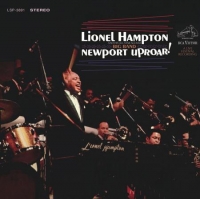Description :
The 1967 Newport Jazz Festival, fourteenth in a world-famous series, was inexplicably the first at which Lionel Hampton had ever appeared. Better late than never, the great vibist and bandleader came, played and conquered. As the ... [Tout afficher]
Description:
The 1967 Newport Jazz Festival, fourteenth in a world-famous series, was inexplicably the first at which Lionel Hampton had ever appeared. Better late than never, the great vibist and bandleader came, played and conquered. As the crowd roars ecstatically at the end of this record, the awed but happy voice of producer George Wein is heard: “This hasn’t happened since Duke...” he begins, casting back in his mind to 1956 and the nearest comparable triumph.
There is nothing quite so effective as a big band at an outdoor jazz festival. So the 1967 Newport programme included those of Count Basie, Buddy Rich, Woody Herman, Don Ellis and Lionel Hampton. Lionel knew the competition he had to face, and knew that in the festival’s climatic spot—the last act on the last night--- his performance would be compared with those of all the others. He prepared accordingly.
Members of his Inner Circle, the octet with which he normally works, would provide the nucleus for an orchestra largely composed of alumni from his earlier bands. When the call went out to the Old Guard, the response was magnificent, as a glance at the personnel will show. Top names in the profession came back to join him, to form one of the great all-star bands of all time. A two week engagement at The Metropole in New York, immediately before the festival, served as a prolonged dress rehearsal, where the ensembles were polished and new arrangements familiarized. Enthusiasm mounted night by night in the Seventh Avenue club, among musicians and public alike, until Newport and the evening of 3rd July were reached. Then, as you will hear, the spirit was willing and the flesh far, far from weak.
All these preparations ensured a good performance, but the spark, the magic necessary to make it a great one, had to come from the leader. Everybody knows that he is a kind of rhythmic dynamo—driving, full of energy, unsparing of himself. His commitment and conviction communicate rapidly with any audience, so that it is soon won over to his side. Yet in the long, ninety minute program, errors in pacing would have been easy, forgivable, but extremely damaging. A climax reached too soon would have led to anti-climax, and a flat feeling as the crowd left the ground. As it was, Lionel’s long professional experience served him superbly, so that his program rose steadily and inexorably to the all-out, emotional frenzy of Flying Home. Like a good general, he never lost his grasp on the situation. He inspired his men by personal example on the vibes, reinforced the beat on a second set of drums, and finally brought up the reserves---Alan Dawson, Milt Buckner and Illinois Jacquet—at just the right time, and in the right spot, to secure an unforgettable triumph and a tumultuous ovation.
[Masquer]







